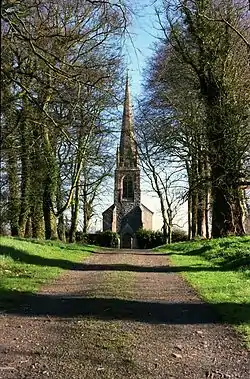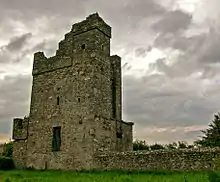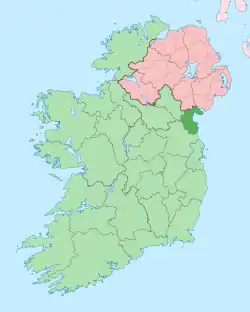Termonfeckin
Termonfeckin or Termonfechin (Irish: Tearmann Feichín, meaning "Féchín's refuge") is a small village and townland in County Louth, Ireland. It is within the parish of the same name, and lies 8 km (5.0 mi) north-east of Drogheda. The population of the village was 653 as of the 2006 census, rising to 1,443 in 2011,[2] and to 1,579 by the time of the 2016 census.[1]
Termonfeckin
Tearmann Feichin | |
|---|---|
Village | |
 St Féchín's Church | |
 Termonfeckin Location in Ireland | |
| Coordinates: 53°46′N 6°16′W | |
| Federation | |
| State | |
| County | County Louth |
| Municipal District | Drogheda Borough District |
| Dáil Éireann | Louth |
| EU Parliament | Midlands–North-West |
| Elevation | 25 m (82 ft) |
| Population (2016)[1] | 1,579 |
| Irish Grid Reference | O142806 |
History
Tradition has it that a medieval monastery was founded in the village by Saint Feichin of Fore in the 7th century. The monastic settlement was plundered by Vikings in 1013 and by the clan Ui-Crichan of Farney on Christmas Day 1025. The monastery was plundered again a century later (in 1149) by raiders from Bregia (Meath).
The village gained ecclesiastical importance in the late 12th century when an Augustinian monastery was founded in the village. A convent of nuns, also of the Augustinian order, was established shortly afterwards and while the monastery didn't survive, the convent flourished in Termonfeckin up until its eventual closure in 1540, following the Reformation of Henry VIII.
Economy
Termonfeckin is primarily dependent on the farming industry. However, tourism also plays a large part, and nearby Baltray and Seapoint, with their coasts and golf courses, attracting visitors.
Transport
Bus Éireann route 189 serves Termonfeckin several times a day (but not Sundays) linking it to Drogheda, Duleek, Ashbourne and Clogherhead. Most buses operate via Baltray though a few go via Grangebellew and Ballymakenny.[3] Drogheda railway station is approximately 9 kilometres distant.
Historical features
Termonfeckin Castle
The extant castle in Termonfeckin is a 15th- or 16th-century tower house of three storeys, with good trefoil headed windows. Its most unusual feature is the corbelled roof, similar to the technique used for the Newgrange chamber roof, which is on the third storey. This castle was damaged in the Irish Rebellion of 1641 but was later repaired by a Captain Brabazon. It is now a National Monument.
Former Primate's Castle


Until the early 19th century Termonfeckin also had another castle. This was the Primate's Castle which was used for several centuries by the Archbishops of Armagh (including Richard Creagh) as an auxiliary residence to their episcopal quarters in nearby Drogheda. After the Reformation, several of the Protestant Archbishops resided periodically in Termonfeckin. The castle's most famous occupant at this time was James Ussher who was Protestant Archbishop of Armagh from 1625 to 1656. He used the castle in Termonfeckin for much of his term up until 1640 when he departed for England, never to return. The castle was damaged in the 1641 Rebellion and was not repaired. It fell into disuse and was eventually demolished around 1830.
High Cross
In the graveyard of St. Fechin's Church of Ireland is a high cross with a winged figure above the Crucifixion on the east face, and Christ in Glory on the west face; the rest of the cross is covered in interlacing and geometrical patterns. At the foot of the cross is a slab with a Crucifixion scene (probably 16th-century) and nearby is the base of another cross. Built into the porch of St. Fechin's church is a stone with an inscription that reads 'A prayer for Ultan and Dubthach who made this stone fort'.
An Grianan
Termonfeckin is also home to An Grianan, a stately home built in the 18th century which was the first residential adult learning college in Ireland. Owned by the Irish Countrywomen's Association, it fulfills many of that organisation's educational and social requirements. An Grianan was also a horticultural college until 2003. An Grianan featured in a recent RTÉ series; ICA bootcamp.
Sport
Gaelic games
Termonfeckin is home to St Fechin's G.A.A. Gaelic Athletic Association club. St Fechins play in Páirc Naomh Feichin and field both Gaelic football and hurling teams. In Gaelic football, the club were Louth Senior Football Championship winners in 1983 and 1984, but now play in the county's Intermediate Club Championship. The club's hurling teams won the Louth Senior Hurling Championship in 2015 and 2016.
Golf
There are two links courses in the area. Seapoint Golf Club is located in Termonfeckin, and County Louth Golf Club is located in Baltray.
Football
In 1997, Termonfeckin's senior football club was founded, with a junior team added in 2008. At the start of the 2015/2016 season, the club started a girl's junior football team.
Natives and residents of note
- Evanna Lynch, actress, starred in the Harry Potter films as Luna Lovegood.
- Arthur Mathews, co-writer of sitcom Father Ted, was a resident.
- Peter McKevitt, priest, author, and sociologist, served as parish priest from 1953 to 1976.
- Molesworth Phillips, who sailed with Captain Cook on his last voyage to the Pacific and who was present at his death in Hawaii.[4] Molesworth had an estate in Termonfeckin and lived there for a time in the 1790s.[5] His wife, Susan Burney, was a sister of the famous English author, Fanny Burney.[6]
- Des Smyth, former European Tour golfer, Ryder Cup Vice Captain and Champions Tour player.
Annalistic references
- M1053.3 - Cormac Ua Ruadhrach, airchinneach of Tearmann-Feichin ... died.
References
- "Sapmap Area - Settlements - Termonfeckin". Census 2016. CSO. Retrieved December 25, 2019.
- Census 2002/2006 for Termonfeckin, p. 146
- http://buseireann.ie/news.php?id=1395&month=Nov
- Robson, John (2014). "Molesworth Phillips (1755-1832)". Cook's Log. Volume 37, number 3: 13 – via Captain Cook Society.
- Quaile, Declan (2005). "An Eighteenth Century Family at Bellcotton". Termonfeckin Historical Society Review. No. 5.
- http://www.thepeerage.com/p28323.htm#i283223
